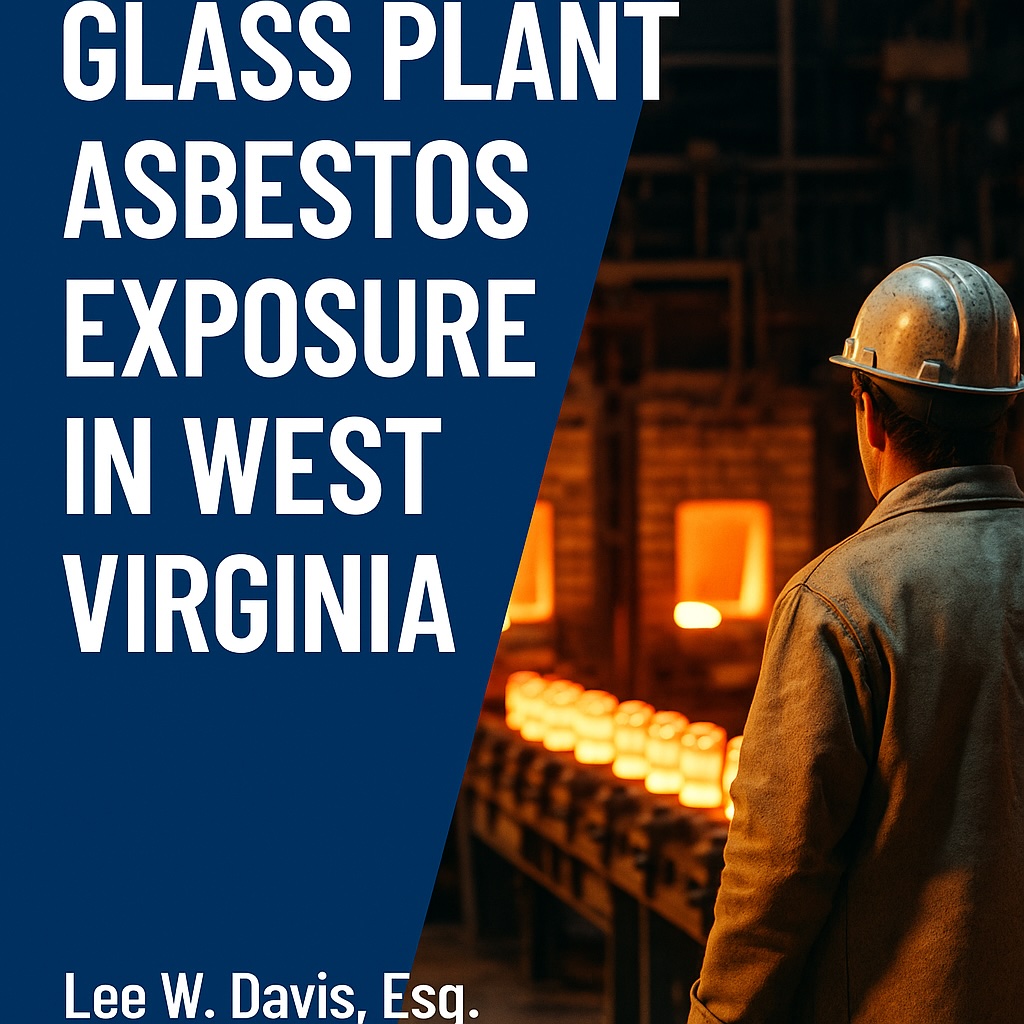Glass plant asbestos exposure in West Virginia harmed workers across generations. These factories—from Clarksburg and Moundsville to Weston and Fairmont—relied on asbestos insulation to control extreme furnace heat. Over time, those materials broke down, exposing workers and even their family members to deadly fibers that caused mesothelioma, lung cancer, and asbestosis.
For more than a century, glass manufacturing has been a cornerstone of West Virginia’s economy. From factories in Clarksburg, Fairmont, and Weston to plants in Moundsville, Wellsburg, and beyond, thousands of workers helped build a thriving industry. But that legacy came at a cost—asbestos exposure in West Virginia glass plants was widespread, deadly, and often unrecognized until decades later.
Why Glass Factories Used Asbestos
The process of making glass requires extreme heat—melting sand, soda ash, and limestone at temperatures over 2,000°F. To insulate furnaces, line ovens, wrap steam lines, and protect workers from burns, these facilities relied heavily on asbestos-containing materials. These included:
- Pipe insulation
- Boiler jackets
- Furnace bricks and gaskets
- Asbestos gloves, aprons, and fireproof shields
Over time, this asbestos would degrade, becoming friable and airborne. Workers would inhale fibers daily—especially maintenance staff, mold setters, repair crews, and those near furnaces or annealing lehrs.
Known West Virginia Glass Plants With Asbestos Risk
While many plants are now shuttered or repurposed, former employees may still be eligible to file claims. Known or suspected asbestos exposure sites include:
- Anchor Hocking Glass – Clarksburg
- Louis Glass Company – Weston
- Hazel-Atlas Glass – Grafton & Clarksburg
- Fostoria Glass – Moundsville
- Carr-Lowrey – Fairmont
- Seneca Glass – Morgantown
- Marble King – Paden City
Some of these facilities used asbestos-laced compounds into the 1980s—even after safety concerns became public.
👉Search Other Asbestos Job Sites in West Virginia
Take-Home Exposure From Glass Plants
The danger didn’t end at the factory gates. Many glass workers brought asbestos fibers home on their uniforms and gear. Wives who did the laundry and children who greeted their fathers at the door were unknowingly exposed. These cases of take-home asbestos exposure have resulted in mesothelioma diagnoses decades later in family members who never worked at the plant.
Legal Help for Asbestos Exposure Victims in WV
If you or a family member worked in a glass factory in West Virginia and were diagnosed with mesothelioma, lung cancer, or asbestosis, you may have legal options.
Even if the company is long gone, bankruptcy trust claims, personal injury claims and wrongful death lawsuits may still be available. You don’t need to remember exact dates or coworkers—our team can help reconstruct your exposure history.
Speak With a West Virginia Asbestos Lawyer Today
Attorney Lee W. Davis has handled asbestos claims since 1988 and understands the job sites, corporate successors, and claims process involved in glass plant exposure cases.
📞 Call (412) 781-0525 or use the secure form below for a free case review.
Check If Your Family Was Exposed
Get your free guide instantly + a confidential case review.
🔒 100% Confidential. No obligations.
FAQs – Glass Plant Asbestos Exposure
How do I know if my old plant used asbestos?
Most glass plants used it in furnaces, pipe insulation, and fireproof gear. We maintain internal lists of likely exposure sites in West Virginia.
Can I file a claim even if I smoked?
Yes. Smokers are still eligible for asbestos-related legal claims, including lung cancer cases.
What if my loved one passed away?
We can help estates and family members pursue compensation for wrongful death.

